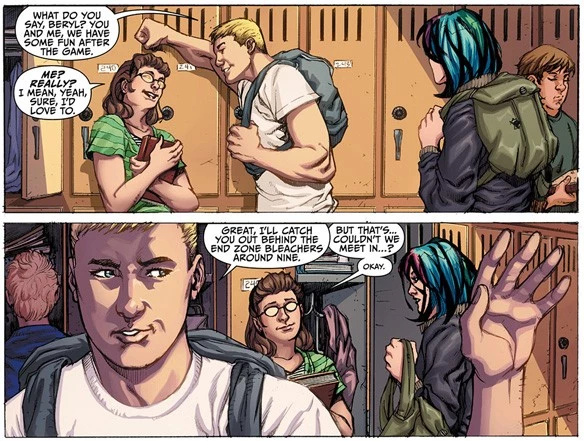
So There’s An Attempted Gang-Rape In The First Issue of ‘Amethyst’

If you'd asked me two days ago if I was excited about Amethyst, Princess of Gemworld's return in the pages of Sword of Sorcery #0, the answer would've been a resounding yes. It seemed like a huge step in the right direction: A comic that dabbled in something outside the standard superhero genre, attempting to appeal to a wider audience of fantasy fans and women and girls with a cover that boasted a really nice updated redesign, and it was scripted by Jem creator and veteran comic writer Christy Marx. I even did a brief interview with Marx based on my excitement for it.
And then I read it when it came out and saw the page where there's an attempted gang-rape. It might not even be necessary to elaborate on why that thoroughly ruined the book for me, but to be honest, it's actually pretty difficult to be mad about it at this point. Throwing rape and the threat thereof into a superhero story to give it an air of edginess and modernism is a trick that writers and editors have pulled over and over and over again over the past 20 years in an attempt to recapture the critical success and importance of Watchmen and, in the case of DC Comics, assure their dwindling readership that Aquaman was definitely not silly, no sir. It's cropped up in stories from Green Arrow to Nightwing, a trend that culminated in the abysmal Identity Crisis, a story explicitly designed to go back and put rape into past comics that didn't already have it. And, to be fair, it's not just DC, either -- superhero comics as a whole have developed an over-reliance on rape as a plot point to signal that they're trying to be more "mature" or "relevant." At Marvel, Kevin Smith added a rape into Black Cat's backstory, and Mark Millar can't do a mini-series without throwing in at least a few hints, if not an outright incest-rape-pregnancy with a "booby-trapped womb" to go along with it. But with DC, it's become mainstream. I had a slight hope last year that the New 52 relaunch would signal that they'd finally move on and stop chasing this thirteen-year-old's idea of "maturity," but it wasn't. They doubled down on it, and here we are.
It might not even be necessary to elaborate on why that thoroughly ruined the book for me, but to be honest, it's actually pretty difficult to be mad about it at this point. Throwing rape and the threat thereof into a superhero story to give it an air of edginess and modernism is a trick that writers and editors have pulled over and over and over again over the past 20 years in an attempt to recapture the critical success and importance of Watchmen and, in the case of DC Comics, assure their dwindling readership that Aquaman was definitely not silly, no sir. It's cropped up in stories from Green Arrow to Nightwing, a trend that culminated in the abysmal Identity Crisis, a story explicitly designed to go back and put rape into past comics that didn't already have it. And, to be fair, it's not just DC, either -- superhero comics as a whole have developed an over-reliance on rape as a plot point to signal that they're trying to be more "mature" or "relevant." At Marvel, Kevin Smith added a rape into Black Cat's backstory, and Mark Millar can't do a mini-series without throwing in at least a few hints, if not an outright incest-rape-pregnancy with a "booby-trapped womb" to go along with it. But with DC, it's become mainstream. I had a slight hope last year that the New 52 relaunch would signal that they'd finally move on and stop chasing this thirteen-year-old's idea of "maturity," but it wasn't. They doubled down on it, and here we are.
That's what makes it so difficult and exhausting to be angry about it. It's not that it's not an abhorrent cliché that sums up everything that's wrong with their line in one tidy scene, because it certainly is that, it's that this just seems to be how it is now. Rape and rape threats have become a cornerstone of the DC Universe. Complaining about it at this point is like complaining about Marvel having a bunch of comics about mutants. It's just something they do in their books because they don't know any other way to tell stories.
The more I thought about it, though, the more infuriating it was, and a large part of it was that this was the last book where I expected it to crop up yet again. As goofy and fannish as it may seem, I feel like they suckered me into getting excited about it, presenting it as a genuine attempt to draw in new readers and experiment with genres that they hadn't tried for a while. Instead, it's just the same thing they always do. They have once again shown themselves to be the Lucy Van Pelt of rape comics, pulling that football away just as soon as you hand over four bucks for the privilege of trusting them not to.
If I'd been slightly less jaded about it, I would've seen it coming. We ran the first five pages as a preview right here on ComicsAlliance, and it's set up there on page two:

But when I read that, I just figured it was setting up the usual, if cliché, teen drama plot point of pranking the nerdy girl, and that Amy Winston would show up and put a stop to it, maybe earning herself a new friend in the process. I didn't expect that it would lead to an attempted rape, because expecting an attempted rape in Amethyst, Princess of Gemworld seems completely insane.
Amy Winston apparently saw it coming, though. When she shows up to defend her new pal, there's a bit of dialogue about how she knew exactly where this story was going.

I guess she's read DC Comics before.
I do think it's a little odd that Amy wouldn't warn her new friend from the start. It's also worth noting that Beryl, the would-be victim, reacts to this whole thing by being angry with her rescuer, I guess for the excessive violence that she uses in dealing out broken noses to her attackers. That bit's at least understandable from the point of view of Beryl in shock, but Amy's world-weary "yeah, I just busted up another gang rape" phone call to her mother is pretty indicative of where these comics are coming from. And all of this goes down while John Constantine -- newly rebooted as a card-carrying Justice Leaguer, albeit a "dark" one -- watches idly from the top of the bleachers, apparently unconcerned about everything that's happening.
It doesn't make any sense, but that's to be expected since nothing about this makes any sense, starting with why it was allowed to get into the script in the first place. I'm all for creators bringing their vision to the page, but you'd think that maybe someone, somewhere along the line would've told Christy Marx "Hey, in this comic about a character aimed at young girls that we're bringing back in conjunction with a short cartoon on Saturday morning, maybe we shouldn't have someone threatened with rape."
Because that's another thing that blows my mind: The miniature Amethyst revival that we're seeing in Sword of Sorcery also comes with a cartoon on the Saturday morning DC Nation block that seems pretty unambiguously designed for kids. I long ago resigned myself to the fact that DC as a company is completely uninterested in making any all-ages Wonder Woman comics that any parent would feel happy about giving to a kid who saw her on all those t-shirts, cartoons and lunchboxes that make her such an important trademark to keep around, but isn't that the entire point of Amethyst? To reach that market that's usually so underserved by their line?
I realize that's a pretty slippery slope. I'm always leery of anyone who props up an argument based on anything resembling "won't someone think of the children," and to be fair, one of the very first comics I ever read involved Robin kicking a drug dealer off a balcony to his death after the dealer beat his girlfriend so bad that she committed suicide. I was six, and it made me a lifelong fan of the company and their characters -- at least until what definitely feels like a concerted effort to drive me as far away from DC as possible. But at best, it's a pretty disjointed marketing strategy that throws away any chance they had to use those two different media to build on each other, and at worst, it's a sign of how little regard they have for their readers that they can't even get through 20 pages of Amethyst without gritting it up to match the rest of the line.
It's also a difficult balance in terms of storytelling. Marx has mentioned before that she's a fan of the character and it certainly seems clear that she went into this story with a mandate to update the character and skew a little older, tapping into that lucrative Young Adult Fantasy market that made Twilight and Hunger Games into billion dollar properties. It's natural that she'd want to deal with themes that were a little darker than what had been done with Amethyst in the past, and as much as I wish it wasn't, the sad reality of the world is that this probably is a relevant issue to include. But to do this? To go back to the same well that they hit up every single time they want to give something a darker coat of paint without cutting off a limb to prove how super serious their superhero fight comics are? How did this make it past any kind of editorial process without someone realizing it was a bad idea?
And the kicker is that there actually is good stuff in this comic. Marx has an interesting (if fairly standard) take on the young-girl-is-lost-princess-of-a-realm-of-magic setup, the inclusion of Amy's mother as a refugee from the dystopian Gemworld is a really nice dynamic, the villain is menacing, and the costume redesigns are really sharp and well-done. Aaron Lopresti's art is expressive and engaging, and there are a few really snappy lines of dialogue. For 19 pages, it's a good, solid comic.
It's just that one page that's bad, and it's so bad that it tanks the whole thing in the most unexpectedly tone-deaf way that it possibly could. I honestly hope that this is just a rough start for the comic, and that over the course of Marx's next eleven issues, it'll shape up into something that will be able to draw in new fans and satisfy everyone who's been waiting for Amethyst's return, but I'm finished with it after this one. You can keep the football, DC, I'm done trying to kick it.
More From ComicsAlliance



![Cast Party: Who Should Star In An ‘Amethyst’ Movie? [Fantasy Week]](http://townsquare.media/site/622/files/2016/10/ame_featured.jpg?w=980&q=75)


![What Exactly Was The Deal With Xorn Anyway? [Mutant Week]](http://townsquare.media/site/622/files/2016/05/Xorn-Featured.png?w=980&q=75)


